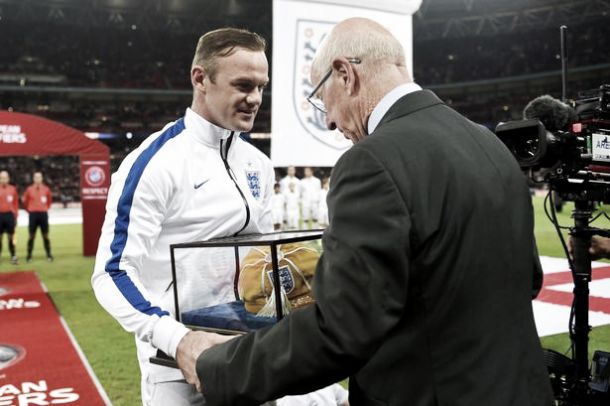As the weeks go on, it is becoming increasingly obvious that Louis van Gaal’s long-term plan at Old Trafford is to evolve the team into a 4-3-3 system. It is a formation that the Dutchman has tried and trusted at previous clubs, and whilst he may feel that Manchester United’s current pool of players might suit an alternative system for now, shown by his experimental dabbles with 3-5-2 and 4-4-2 diamond earlier this season, it is more than likely that van Gaal sees his 4-3-3 as the way forward.
Whilst the 4-4-2 diamond (known to some as a 4-1-2-1-2) has provided some success for United this season, it has looked particularly vulnerable in defensive transition and been deficient in balance; weaknesses a 4-3-3 would help to address. The system would still allow Rafael and Luke Shaw the attacking license they had in the diamond formation, only better protected and covered by a more stable three-man midfield.
However, for all its advantages, of which there are many more, a 4-3-3 system ultimately presents van Gaal with a precarious dilemma: where does Wayne Rooney fit in all this?
On paper, Wayne Rooney is arguably the best English footballer ever to have graced the beautiful game. On paper, he should be undroppable. England’s EURO 2016 qualifier against Slovenia was Rooney’s 100th cap, a game in which he scored his 44th international goal, and you would be a brave man to bet against the striker eventually becoming England’s all-time top goalscorer, with Rooney currently just five goals behind Bobby Charlton’s record.
His goalscoring stats for club are equally impressive, with his 176 Premier League goals making him the third highest all-time goalscorer in the division, steadily closing down Andy Cole’s 189 strikes in second. These feats are made ever the more impressive by the fact he has been played out wide or behind the main striker for the large part of his career, in theory disadvantaging him as he will not naturally find himself in as many goalscoring areas of the pitch as a traditional #9 would.
Yet despite these impressive numbers, it may be the case for Wayne Rooney that Benjamin Disraeli’s infamous line of “lies, damned lies and statistics” has never been more accurate. Whilst Rooney may eventually bear the title of England’s all-time top goalscorer, and indeed he may achieve the same feat for Manchester United (Rooney is currently just 30 goals behind Bobby Charlton, who also leads the goalscoring charts at United), he will never be seen as a true England, nor United, great. It is unlikely we will ever talk about Rooney in the same bracket as the likes of Cantona and Ronaldo, Moore and Charlton. For all his achievements and talent, Rooney’s career will always be remembered as a case of unfilled potential, a fish that simply slipped the net of world-class players.
Perhaps this may seem a little harsh on Rooney. After all, he has five Premier League medals and a Champions League title to his name before he’s even reached his 30th birthday. He is the captain of club and country. He is still the best player England have right now, the hero the country looks towards when the Three Lions are a goal down in the dying stages of a match.
But as we all know, stats never tell the whole story. Does he really deserve the role of captain, for England or for Manchester United? Did he suddenly turn into a natural leader over the summer, a trait he’s never really shown in the past, or was it rather a case that he was the only option? As Joey Barton might crudely put it, he was simply the best out of a group of ugly girls. And whilst his talent is undoubtedly there, it would be hard to argue that Rooney hasn’t been retaining his place in the starting XI based solely on reputation at times. His reputation has been his best selling point in recent years all too often, regularly getting into the team despite consistently poor performances.
It shouldn’t have been like this. Wayne Rooney should have been able to walk into any team in the world. Have a quick search into YouTube and you’ll find endless videos of the Englishman’s blistering talent as a teenager. Look at highlights of his performances at Euro 2004, running amok amongst a French side that consisted of a multitude of World Cup and European Championship winners. There was no fear in his eyes, just a raw instinct to score goals. As the nation marvelled at their 18 year old hero terrorising experienced defenders such as Lilian Thuram, the most capped player in the history of the France national team, there was a sense of optimism, expectation almost, that this wonderkid would soon be seen amongst the world’s greatest. It should have been Cristiano Ronaldo, Lionel Messi and Wayne Rooney.
Yet it wasn’t. Whilst Messi and Ronaldo were breaking all sorts of records in Spain as the 21st century entered its second decade, Rooney was plugging along at Old Trafford. Scoring goals, making goals, and playing some of his best football in a Manchester United shirt, but never quite reaching the level of his now-immortalised counterparts. It’s not to say that Rooney didn’t develop into a brilliant player, because he did, it’s simply that he never reached the heights that a nation once dreamt of.
As a result, Louis van Gaal now finds himself in a troubling predicament. Rooney is his captain, but clearly does not fit in a 4-3-3. The Englishman has previously stated that his preferred position is up front. However, Rooney’s tendency to drift around the pitch and collect the ball from deeper positions makes it difficult for him to play as a lone striker effectively. It remains doubtful whether he has the hold-up play or the willingness to run the channels in behind the defence to be the main man up top. Van Gaal would also have to bench both Robin van Persie and Radamel Falcao to play Rooney as a striker, a situation that seems particularly unlikely, even with van Persie’s recent downturn in form, considering the records of the different strikers.
Indeed, during the 2009/10 season, one of the few campaigns in which Rooney was deployed as a main striker, his shots-per-game ratio (Premier League only) is a worryingly high 5.7, with an average of 0.81 goals-per-game. In comparison, Falcao, during his two years at Atletico Madrid (the strongest league that he has played in), scored 0.78 goals-per-game. Although this is narrowly lower than Rooney’s, it has to be considered that he only had an average of 3.6 shots-per-game, whilst playing for a weaker team that was not as competitive for titles as Manchester United were.
Rooney’s 5.7 shots-per-game is simply too wasteful for a lone striker, and in comparison to Diego Costa this season, who also plays in a one-striker system, the Spaniard has over a goal a game with only an average of 3.1 shots each match. If Manchester United are to eventually rise back to their astronomically high standards, that simply is the level that the main striker of a top team has to reach, and it remains to be seen whether Rooney can match it.
Another alternative for van Gaal is to play Rooney out wide or in central midfield, but his captain has spoken publicly against such an idea in the past and doesn’t really have the attributes to fill either position anyway. He lacks the pace and trickery to be an effective winger, and although some of his best performances in an United shirt have come from out wide in the past, he is not the same dynamic player now and it is unlikely that he will be able to successfully fill the role required.
Central midfield has been a long-term suggestion for Rooney’s future position as he enters the latter stages of his career, but this proposition has been based on the high work rate and extensive passing range of his days of yesteryear, both attributes which have significantly declined for the Englishman over the past couple of seasons. He can no longer play an incisive through ball in the manner he regularly did for United in the late 2000s under Ferguson, whilst his long-range passes now seldom finds its target. His qualities as a central midfielder have all but diminished.
It has been relatively obvious that Rooney has been a footballer on the decline, and unless he finds a way to stop the slump, it will become increasingly hard for van Gaal to select the Englishman in his starting XI. He may be a star name, and he may be the captain, but van Gaal is more than decisive enough to drop him. With a loss of form often comes a loss of confidence, and for Rooney it has been no different. The forward cuts a frustrated figure at Old Trafford at times, not helped by the team’s recent disappointing results, and he has lost the sharpness and dynamism that once made him the brilliant player he was.
He no longer has the fire in his eyes, the frightening enthusiasm and passion that drove fear into the heart of opposing teams. He doesn’t possess the ability or drive to single-handedly drag his team out of trouble anymore, nor the ability to consistently bring thousands of fans to their feet with moments of sheer genius. He ultimately isn’t the same player that he used to be, and it hasn’t been a change for the better. As with the rest of England’s golden generation, Rooney’s career will likely be reflected on as a case of what might have been, and though he still should have at least a few years left in him at the top, it is hard to suggest he will ever reach the levels he did when he was younger.
At the end of the day, Rooney seems very much like a square peg in a round hole at Old Trafford at the moment. He is out of form, although it has to be said that his team-mates are hardly setting the world alight either, and would have to be played out of his preferred position in order to fit into the starting XI. Maybe it’s simply the case that the 4-3-3 that van Gaal wants to play simply doesn’t have room for Rooney, and attempting to fit him in would merely be detrimental to the team. Only time will tell. The next year will more or less determine the rest of Rooney’s career; it’s time to prove that he can still be an effective player for Manchester United as he enters his 30s, or else one of the brightest footballers ever to have played for England might just start fading away into mediocrity.










































